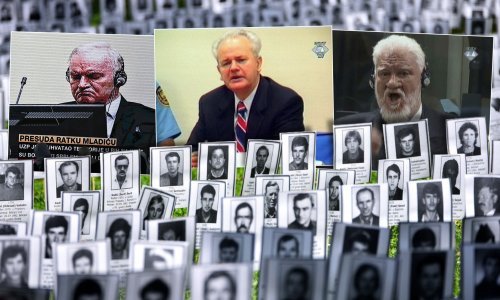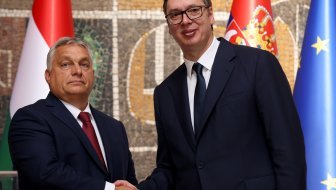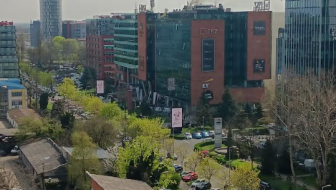The defence of the former defence minister of the Croat Community of Herceg Bosna, Bruno Stojic, said in a closing statement at the Hague war crimes tribunal on Tuesday there had been no plan to create a Greater Croatia and that Herceg Bosna had been created to protect the rights of Croats in Bosnia and Herzegovina.
He was speaking at a trial of six former Bosnian Croat leaders accused of crimes committed during the 1992-95 war in Bosnia and Herzegovina.
Stojic's attorney Karim Khan said the prosecutors based their case on the argument about the division of Bosnia and Herzegovina and the creation of a Greater Croatia, adding this did not correspond to the evidence.
Khan said the beginning of the war in Bosnia and Herzegovina brought former Yugoslav army attacks on neighbouring Croatia and an attack on the Croat-populated village of Ravno in Herzegovina. That led to the establishment of the Croat Community of Herceg Bosna and not a joint criminal plot to divide Bosnia and annex part of its territory to Croatia, Khan said, adding the Croats had wanted to secure their rights, which was not a crime.
Leaders of the former self-styled Croat Community of Herceg Bosna - Prime Minister Jadranko Prlic, Defence Minister Stojic, HVO (Bosnian Croat Defence Council) generals Slobodan Praljak and Milivoj Petkovic, the commander of the HVO military police, Valentin Coric, and the head of the commission for the exchange of prisoners of war, Berislav Pusic - are accused of a joint criminal enterprise against Bosniaks and other non-Croats in areas of Bosnia and Herzegovina which they wanted to annex to Croatia.
The prosecutors said in their closing statement last week that it had proved the involvement of the accused in the joint criminal enterprise aimed at the ethnic cleansing of Herceg Bosna and its annexation to Croatia with a view to creating a Greater Croatia. They said the enterprise was led by Croatia's first president, the late Franjo Tudjman, and that the persecution and attempt to divide Bosnia and Herzegovina were carried out in close cooperation between Herceg Bosna and Zagreb.
If an agreement on the division of Bosnia between Tudjman and former Serbian President Slobodan Milosevic existed, there would be no Bosnia today and its existence is the biggest proof that there was no plan to divide it, said Khan.
He said the division agreement argument was also refuted by the fact that the Croats and the Serbs had continued to fight on Bosnian territory, the fact that 80-90 per cent of arms and fuel for Muslims had come via Croatia, and the fact that the Army of Bosnia and Herzegovina had rear divisions in Zagreb and Split.
Khan said Stojic had been sensitive to the suffering of all in the Bosnian war, as claimed by Muslim witnesses, one of whom said he came to testify for a person who had helped his people.
Khan said that even foreign witnesses testified that Stojic had not exhibited discriminatory or anti-Muslim sentiments, adding that he was described as a person who had made no distinction in socialising with either Croats or Serbs or Bosniaks, but as someone who had promoted Muslims to higher positions.
Is he just another racist motivated by hate and arrogance or is he a different man, Khan wondered, saying there was no evidence of Stojic's guilt.
Senka Nozica, another counsel for Stojic, dismissed as unacceptable the prosecutors' comparison of the six accused with the Nazis.
Prior to Stojic's attorneys, Prlic's defence counsel Michael Karnavas ended his closing statement, saying there was no evidence against his client.






![[FOTO] Na Laništu opet naslikan mural Slobodanu Praljku, što će učiniti Tomašević?](/media/thumbnail/500x300/1598908.jpeg?cropId=0)
![[FOTO] Muškarac revoltiran uklanjanjem murala došao pred Gradsku upravu i pisao sprejem](/media/thumbnail/500x300/1568140.png?cropId=0)



























